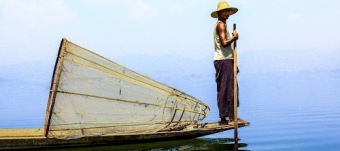Myanmar tourism is booming. The growth in tourism brings prosperity but may also put children at risk. The Code of Conduct for the Protection of Children from Sexual Exploitation in Travel and Tourism (The Code), a non-governmental organisation, has recently started working in Myanmar to help local tourism companies protect children from abuse.
Latest tourism figures show the number of international visitors to Myanmar doubled from 2012 to 2013 to reach two million. Growth is expected to continue with over seven million annual visitors projected by 2020. This tourism boom brings far-reaching social and economic advantages for Myanmar. It also carries risks, especially for children.
In neighbouring Thailand, known as a sex tourism destination, the U.S. Department of State has reported that 60,000 children under the age of 18 are working as prostitutes, while in India UNICEF has estimated that 40% of the country’s three million prostitutes are minors.
In Myanmar, a recent UNICEF investigation found that almost 30% of the country’s children are not legally registered, leaving them vulnerable to exploitation.
Myanmar’s government and tourism industry have had the vision and foresight to attempt to prevent crimes against children before they occur.
As one of nine guiding principles from the Tourism Master Plan, a roadmap for sustainable tourism development until 2020, the industry and government will apply ethical standards to tourism development aimed at minimising social, economic, and environmental harm.
One key step towards this vision is to encourage local tourism service providers and authorities to detect and prevent child abuse, particularly human trafficking and sexual exploitation.
One of the simplest and most concrete ways for tourism companies to take action to protect children is by joining The Code, an international non-governmental organisation dedicated to partnering with the tourism industry to protect children from sex tourism.
“The Code provides practical know how to tourism companies of any size that want to protect children in Myanmar”, explained Ms. Patchareeboon Sakulpitakphon, The Code’s Project Manager for Myanmar.
The Code was officially launched in Myanmar on 19 May at a Forum on Child Protection in Sustainable and Responsible Tourism, organised by The Code in collaboration with the Myanmar Ministry of Hotels and Tourism and the Myanmar Tourism Federation, and attended by top government officials, the tourism industry, and representatives of Myanmar’s civil society.
“We are very encouraged by the positive response we have got so far from Myanmar’s government officials and tourism industry,” said Ms. Sakulphitakphon, who explained that the forum was the first in a series of activities planned this year.
Smaller training events will follow, targeting tourism staff and teaching them about child protection issues relevant to the tourism sector. Training will include how to recognise and report suspected cases of sexual exploitation of children.
The Code is a tool that any responsible tourism company can adopt to protect children from sexual exploitation. Members of The Code range from major multinational companies like Accor Hotels, Hilton Worldwide, Delta Air Lines, and Kuoni Travel, to small tour operators and independent guest houses.
“The protection of Myanmar’s children from sexual exploitation is as important as any other development activity,” says U Kyaw Min Htin, Managing Director of Myanmar Polestar Travels and Tours, the first of seven companies who have already joined The Code in Myanmar.
Tourism companies interested in attending one of The Code’s information and training sessions throughout Myanmar between July and September should email events@thecode.org.
To join The Code and starting taking action to protect children in tourism please visit www.thecode.org/join to apply today.



